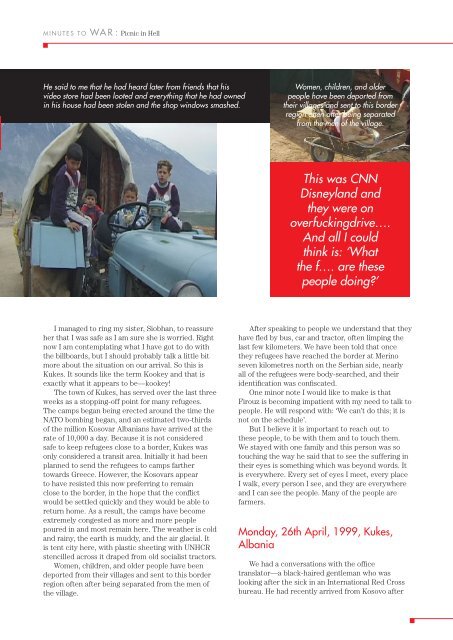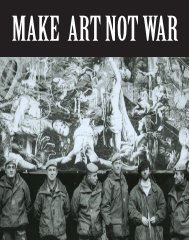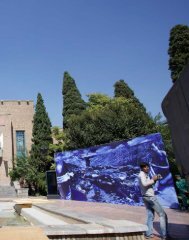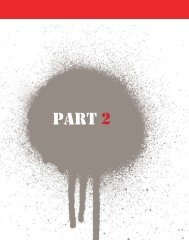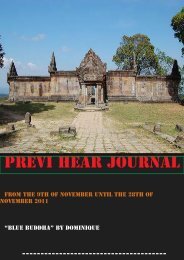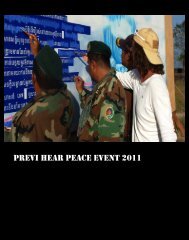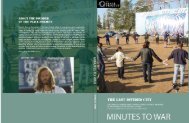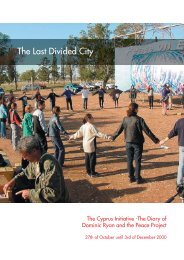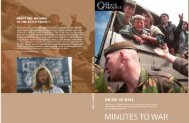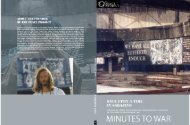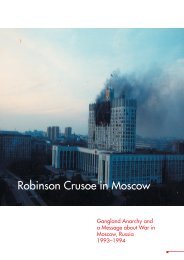You also want an ePaper? Increase the reach of your titles
YUMPU automatically turns print PDFs into web optimized ePapers that Google loves.
M I N U T E S T O WA R : Picnic in Hell<br />
He said to me that he had heard later from friends that his<br />
video store had been looted and everything that he had owned<br />
in his house had been stolen and the shop windows smashed.<br />
Women, children, and older<br />
people have been deported from<br />
their villages and sent to this border<br />
region often after being separated<br />
from the men of the village.<br />
This was CNN<br />
Disneyland and<br />
they were on<br />
overfuckingdrive….<br />
And all I could<br />
think is: ‘What<br />
the f…. are these<br />
people doing?’<br />
I managed to ring my sister, Siobhan, to reassure<br />
her that I was safe as I am sure she is worried. Right<br />
now I am contemplating what I have got to do with<br />
the billboards, but I should probably talk a little bit<br />
more about the situation on our arrival. So this is<br />
Kukes. It sounds like the term Kookey and that is<br />
exactly what it appears to be—kookey!<br />
The town of Kukes, has served over the last three<br />
weeks as a stopping-off point for many refugees.<br />
The camps began being erected around the time the<br />
NATO bombing began, and an estimated two-thirds<br />
of the million Kosovar Albanians have arrived at the<br />
rate of 10,000 a day. Because it is not considered<br />
safe to keep refugees close to a border, Kukes was<br />
only considered a transit area. Initially it had been<br />
planned to send the refugees to camps farther<br />
towards Greece. However, the Kosovars appear<br />
to have resisted this now preferring to remain<br />
close to the border, in the hope that the conflict<br />
would be settled quickly and they would be able to<br />
return home. As a result, the camps have become<br />
extremely congested as more and more people<br />
poured in and most remain here. The weather is cold<br />
and rainy, the earth is muddy, and the air glacial. It<br />
is tent city here, with plastic sheeting with UNHCR<br />
stencilled across it draped from old socialist tractors.<br />
Women, children, and older people have been<br />
deported from their villages and sent to this border<br />
region often after being separated from the men of<br />
the village.<br />
After speaking to people we understand that they<br />
have fled by bus, car and tractor, often limping the<br />
last few kilometers. We have been told that once<br />
they refugees have reached the border at Merino<br />
seven kilometres north on the Serbian side, nearly<br />
all of the refugees were body-searched, and their<br />
identification was confiscated.<br />
One minor note I would like to make is that<br />
Firouz is becoming impatient with my need to talk to<br />
people. He will respond with: ‘We can’t do this; it is<br />
not on the schedule’.<br />
But I believe it is important to reach out to<br />
these people, to be with them and to touch them.<br />
We stayed with one family and this person was so<br />
touching the way he said that to see the suffering in<br />
their eyes is something which was beyond words. It<br />
is everywhere. Every set of eyes I meet, every place<br />
I walk, every person I see, and they are everywhere<br />
and I can see the people. Many of the people are<br />
farmers.<br />
Monday, 26th April, <strong>1999</strong>, Kukes,<br />
Albania<br />
We had a conversations with the office<br />
translator—a black-haired gentleman who was<br />
looking after the sick in an International Red Cross<br />
bureau. He had recently arrived from Kosovo after


